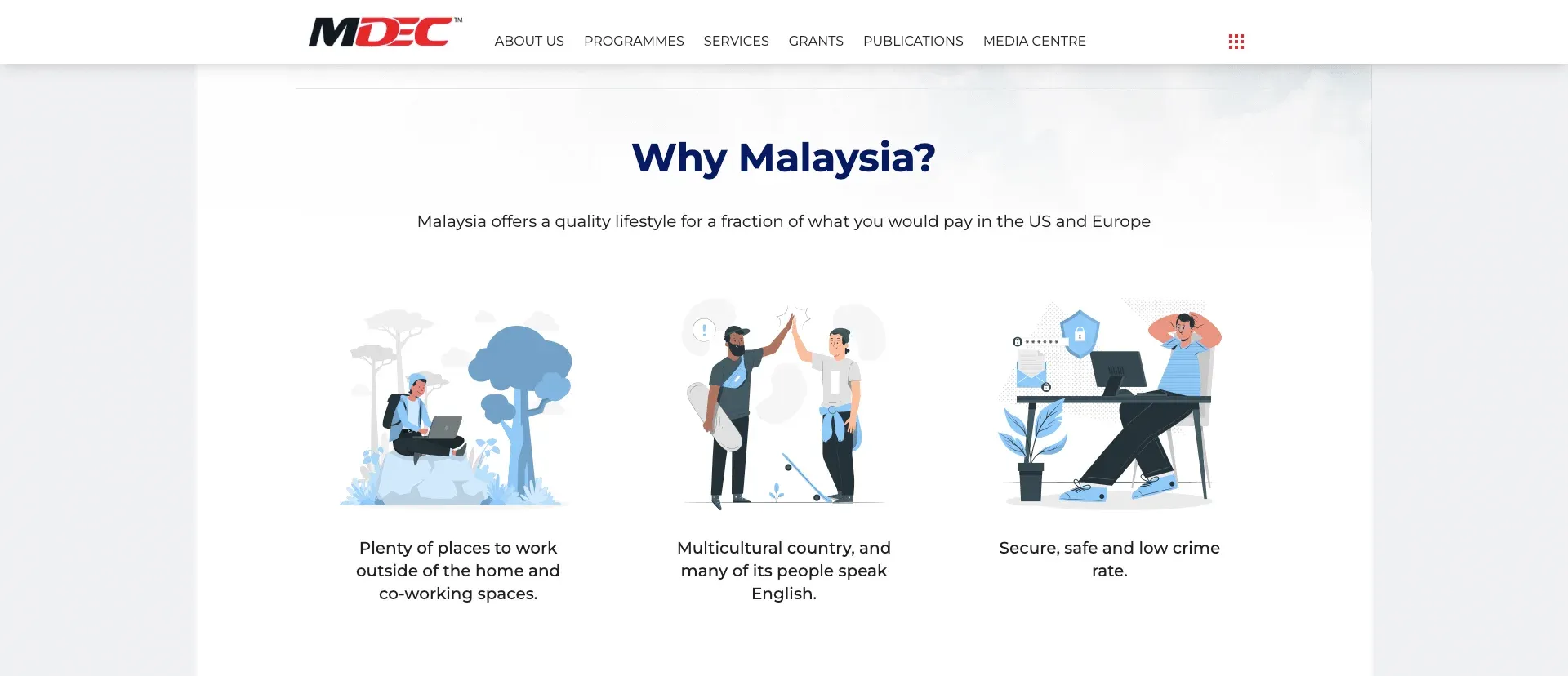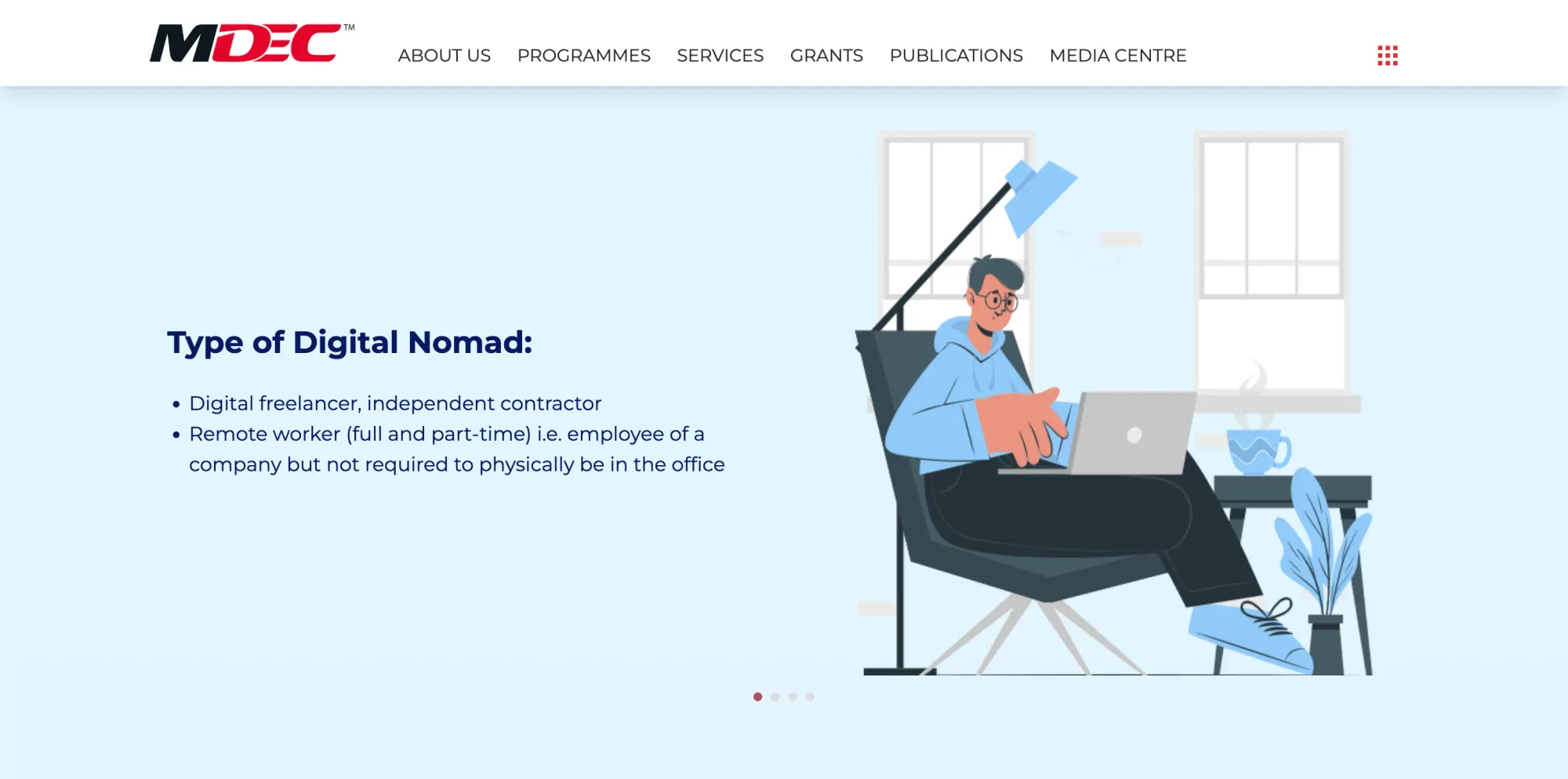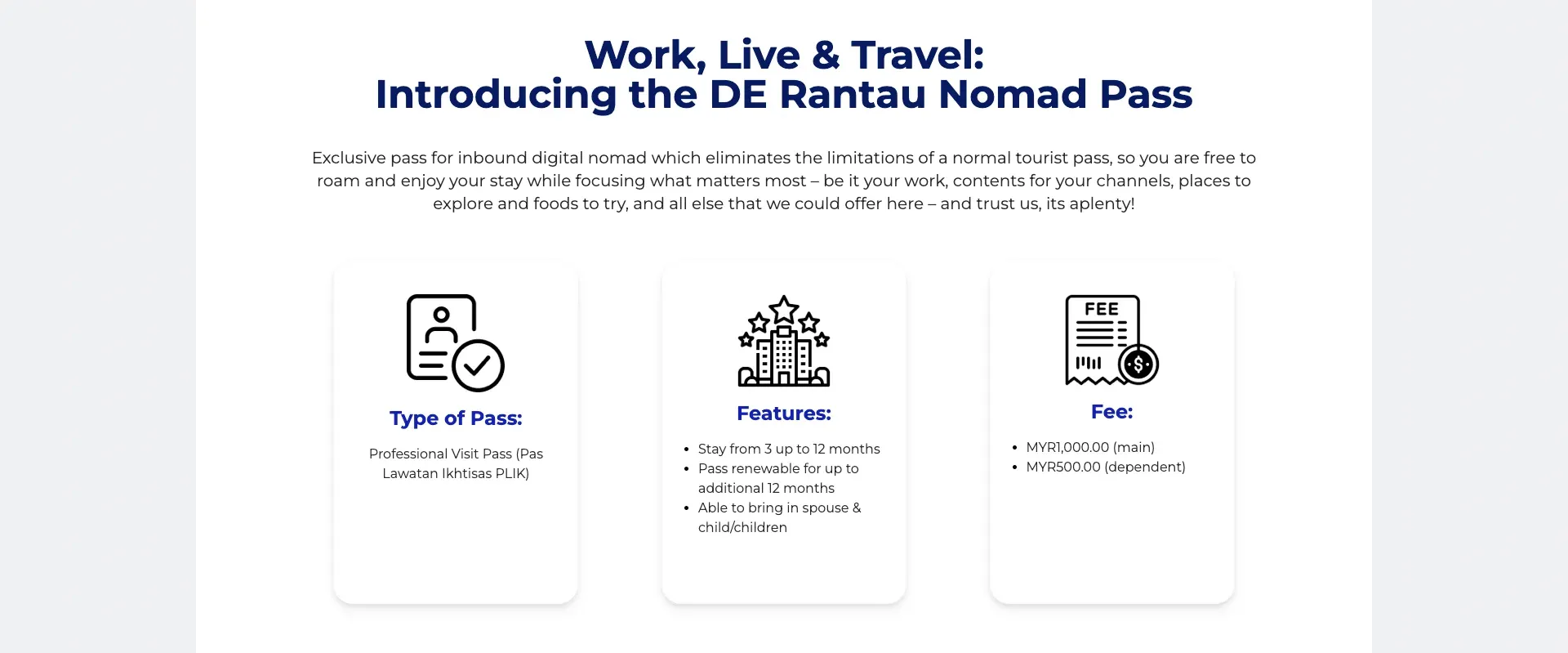Malaysia Digital Nomad Visa: Requirements and How to Apply

The rise of Malaysia as a destination for digital nomads is evident, with long-term stay nights on Airbnb growing from 11.6% to 18.6% of total nights booked by international guests from 2019 to 2022.
Malaysia's Digital Nomad Visa aims to make the country even more accessible to digital nomads globally, inviting them to experience Malaysia's culture, landscapes, and communities for up to a year, with the option for renewal.
In this article, we will guide you through everything you need to know about the Malaysia Digital Nomad Visa, from eligibility and application steps to practical advice for making the most of your stay in Malaysia. Let's jump right in!
Quick Visa Facts
Visa validity period
3 to 6 months
Possible to extend?
Yes, for a further 12 months
Who can apply?
Freelancers, contractors, and remote workers who are involved in the IT and digital-related industry
Minimum Income Requirements
$24,000 USD per year
Cost of visa application
220 USD
Time for visa applications
4-8 weeks
Does Malaysia Have a Digital Nomad Visa?
Yes, Malaysia does have a Digital Nomad Visa, officially known as the DE Rantau Programme.
This digital nomad visa was introduced in October 2022 to allow remote workers to reside in Malaysia for a period of 3 to 12 months. It is a Multiple Entry visa and can be extended for a further 12 months upon expiration.
About the DE Rantau Programme, this is what Tan Sri Annuar, the Minister for the Ministry of Communications and Multimedia Malaysia, stated to Techwire Asia:
"It will help solidify Malaysia’s path to becoming the preferred digital nomad hub of the ASEAN region. We have a robust infrastructure, affordable cost of living, cultural diversity, a multilingual population, delicious cuisines, and many more offerings to strengthen our position"

What are the Benefits of the Malaysia Digital Nomad Visa?

The Malaysia Digital Nomad Visa offers several benefits for those who qualify:
- It allows a stay from 3 up to 12 months, with the option to renew for an additional 12 months.
- It provides exclusive access to resources and amenities specifically designed for digital nomads, including living and working hubs, handpicked local services, and discount vouchers.
- It allows for multiple entries into Peninsular Malaysia. However, it is important to note that entry into Sabah or Sarawak currently requires a tourist pass.
- Passholders can bring in their spouse and children, making this a very family-friendly visa option for digital nomads who wish to travel with their immediate family.
Who Can Apply for the Malaysia Digital Nomad Visa?
To apply for the Malaysia Digital Nomad Visa, you must be either a freelance professional, an independent contractor, or a remote worker who is involved in various IT and digital-related industries.

The specific sectors that qualify for this program include in fact:
- Software engineering
- Backend engineering
- User Experience (UX) design
- User Interface (UI) design
- Cloud computing
- Cybersecurity
- Blockchain technology
- Artificial Intelligence (AI)
- Machine learning
- Data management
- Digital marketing
- Digital creative content
- Digital content development
How to Apply for the Malaysia Digital Nomad Visa as a Digital Nomad
To apply for the Malaysia Digital Nomad Visa, you have to follow these steps:
Step 1: Gather Necessary Documents
Before beginning your application, you should collect all required documents. The complete list of documents necessary to submit your application can be found in the section below.
Step 2: Submit Application Online
Register your account on the Malaysia Digital Economy Corporation (MDEC)’s official website and select the option for the “DE Rantau Digital Nomad Visa”. Then, fill in the application form with your personal details and work information, upload the necessary documents, and pay the visa fee.
Step 3: Wait for Approval
After submitting your application and documents, the processing time can take up to six to eight weeks. Once the application is approved, a pass sticker, which serves as the physical evidence of your visa, will be issued to you.
Documents Required for Applying for the Malaysia Digital Nomad Visa
To apply for the Malaysia Digital Nomad Visa, you need to submit the following documents:
- A valid Passport with at least 14 months remaining validity at the time of applying and a minimum of six empty pages.
- Proof of Remote Work demonstrating work for companies or clients located outside of Malaysia for at least 3 months. This includes valid project contracts signed for 3 months or more.
- Proof of Income showing at least $24,000 per year, including your most recent 3 months of bank statements and income statements or latest tax returns.
- A clean criminal record, demonstrated through a letter of good conduct issued by an authoritative body in your home country or country of residence.
- Valid medical insurance covering the duration of your stay in Malaysia, which should also include coverage for dependents if accompanying you.
- Educational and Professional Documents, such as your latest CV and highest education certificate, along with any additional professional qualifications relevant to your field of work.
- Payment of a Personal Bond, a refundable financial guarantee to the Malaysian government, which acts as a security deposit. The Personal Bond is paid at the time of application or issuance of the visa. It is generally refunded once the visa expires and if all conditions of the visa stay have been met without any violations.
How Much Does the Malaysia Digital Nomad Visa Cost?

The cost of the Malaysia Digital Nomad Visa is generally around RM 1,000 (~220 USD). If you plan to bring dependents (such as a spouse or children) with you, there is an additional fee of RM 500 (~110 USD) per dependent.
Timeline for Applying For the Malaysia Digital Nomad Visa
Once all required documents are prepared, and the application has been submitted, the timeline for applying for the Malaysia Digital Nomad Visa ranges from 4 to 8 weeks. This time frame can vary, especially if additional information or documents are required during the due diligence process.
After your application is approved, the issuance of the pass sticker is generally completed within about 1 week.
What if I’m Not Eligible for the Malaysia Digital Nomad Visa as a Digital Nomad?
If you're not eligible for the Malaysia Digital Nomad Visa, there are several alternatives to consider for staying in Malaysia:
- Single Entry Visa: This visa allows a stay of 30 days. The application process is straightforward, requiring documents like a valid passport, photographs, proof of accommodation, and a return flight document.
- Multiple Entry Visas: This type of visa is suitable for multiple entries into Malaysia, primarily for tourism or family visits, and is valid for 90 days, with each stay lasting 15 or 30 consecutive days. The application for a multiple entry visa is made at a consulate or embassy, and requires similar documentation to the single entry visa.
- Tech Entrepreneur Program: Also known as the Foreign Knowledge Entrepreneurs (FKE) program, this visa is aimed at individuals with business ideas. It has two subcategories: Start-ups and Matured Digital Entrepreneurs, catering to different stages of business development.
Paying Taxes as a Digital Nomad in Malaysia

When it comes to paying taxes as a digital nomad in Malaysia, navigating the tax system involves understanding several key points:
- Tax Obligations in Malaysia: The Inland Revenue Board (IRB) of Malaysia taxes individuals based on the work performed in the country, regardless of where the payment originates. This means digital nomads earning income while in Malaysia might be subject to Malaysian income tax.
- Determining Tax Residency: In Malaysia, tax residency is determined by factors like the length of stay and purpose of stay. An individual is considered a tax resident if they have lived in Malaysia for 182 days or more in a calendar year. Tax residency status affects the amount of taxes you must pay.
- Variety of Taxes: Digital nomads should be aware of various types of taxes, such as income tax, Value-Added Tax (VAT), capital gains tax, social security contributions, and property taxes. It's important to register with the local tax authority and file tax returns on time to avoid penalties and fines.
- Avoiding Double Taxation: Double taxation can be an issue for digital nomads earning income from multiple countries. To avoid this, they can benefit from tax treaties between Malaysia and other countries. These treaties often provide lower tax rates, tax exemptions on specific types of income, and reduced compliance costs. Keeping accurate records of income, expenses, and time spent in each country is crucial for demonstrating tax residency and eligibility for treaty benefits
Are You Ready To Live and Work in Malaysia as a Digital Nomad?
If you want more digital nomad guides like these, sign up for our free newsletter and get upcoming articles straight to your inbox!
Freaking Nomads is supported by you. Clicking through our links may earn us a small affiliate commission, and that's what allows us to keep producing free, helpful content. Learn more







 Travel tips, hacks, and news
Travel tips, hacks, and news Exclusive travel discounts
Exclusive travel discounts Offers and promotions
Offers and promotions Digital nomad inspiration
Digital nomad inspiration Latest articles form our blog
Latest articles form our blog
Comments ()